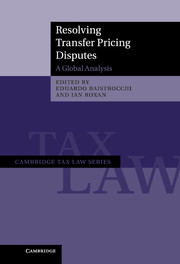Book contents
- Frontmatter
- Contents
- List of figures
- List of tables
- List of contributors
- Acknowledgements
- The Golden Bridge: analytical table of cases by topics in the OECD Guidelines
- Table of Cases
- Abbreviations
- Part I The context of transfer pricing disputes
- Part II North America and Europe
- Part III Asia Pacific
- Part IV BRIC Countries
- Part V South America, Middle East and Africa
- 17 Transfer pricing disputes in Argentina
- 18 Transfer pricing disputes in Chile
- 19 Transfer pricing disputes in Israel
- 20 Transfer pricing disputes in Africa
- Part VI Conclusion
- Index
20 - Transfer pricing disputes in Africa
from Part V - South America, Middle East and Africa
Published online by Cambridge University Press: 05 November 2014
- Frontmatter
- Contents
- List of figures
- List of tables
- List of contributors
- Acknowledgements
- The Golden Bridge: analytical table of cases by topics in the OECD Guidelines
- Table of Cases
- Abbreviations
- Part I The context of transfer pricing disputes
- Part II North America and Europe
- Part III Asia Pacific
- Part IV BRIC Countries
- Part V South America, Middle East and Africa
- 17 Transfer pricing disputes in Argentina
- 18 Transfer pricing disputes in Chile
- 19 Transfer pricing disputes in Israel
- 20 Transfer pricing disputes in Africa
- Part VI Conclusion
- Index
Summary
Introduction: the African tax sphere
The basis of taxation in the African continent varies quite considerably from country to country. Many African countries have a residency basis for taxation while others tax on a territoriality basis, and some such as Liberia tax on a blend of the two bases.
Turning to individual countries, companies resident in Mauritius are subject to income tax on their worldwide income. Resident companies are companies incorporated in Mauritius and companies with their central management and control in Mauritius. If a non-resident company has a branch carrying on business in Mauritius, the non-resident company is subject to tax on the income of the branch.
Likewise Nigerian resident companies are subject to tax on their worldwide profits. Non-resident companies are taxed on the profits of their operations in Nigeria only. Resident companies in Uganda are also subject to tax on their worldwide income, but tax credits are granted for tax paid on foreign-source income. Non-resident companies are subject to tax on income derived from sources in Uganda only.
Angolan companies carrying out industrial and commercial activities in Angola are subject to industrial tax (corporate income tax). An Angolan company, which is a company that has its head office or effective management and control in Angola, is subject to industrial tax on its worldwide profits.
- Type
- Chapter
- Information
- Resolving Transfer Pricing DisputesA Global Analysis, pp. 790 - 832Publisher: Cambridge University PressPrint publication year: 2012



